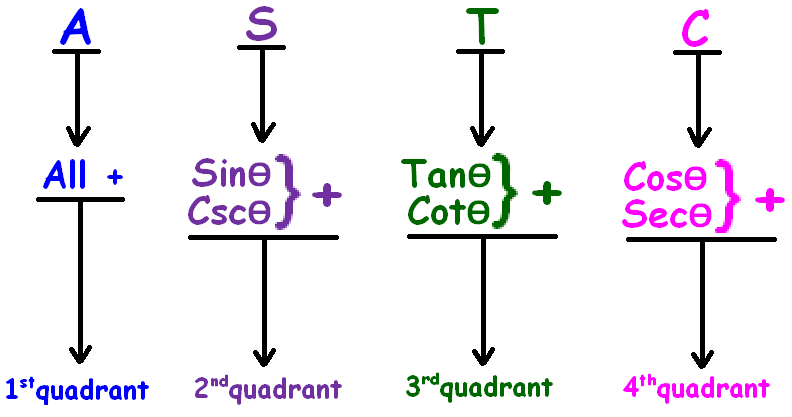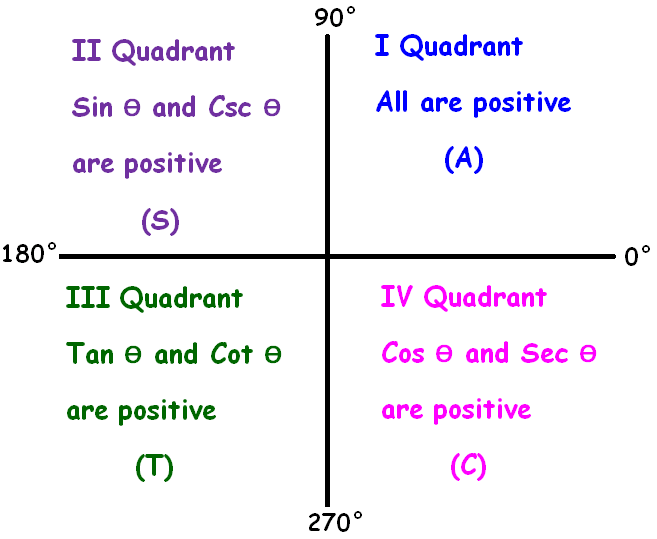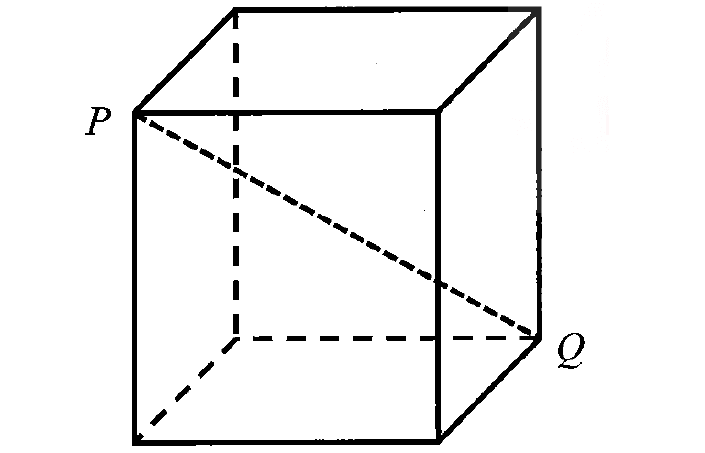TRIGONOMETRIC RATIOS OF 90 DEGREE PLUS THETA
Trigonometric ratios of 90 degree plus theta is a part of ASTC formula in trigonometry.
Trigonometric ratios of 90 degree plus theta are given below.
sin (90° + θ) = cos θ
cos (90° + θ) = - sin θ
tan (90° + θ) = - cot θ
csc (90° + θ) = sec θ
sec (90° + θ) = - csc θ
cot (90° + θ) = - tan θ
Let us see, how the trigonometric ratios of 90 degree plus theta are determined.
To know that, first we have to understand ASTC formula.
The ASTC formula can be remembered easily using the following phrases.
"All Sliver Tea Cups"
or
"All Students Take Calculus"
ASTC formla has been explained clearly in the picture shown below.

More clearly

From the above picture, it is very clear that
(90° + θ) falls in the second quadrant
In the second quadrant (90° + θ), sin and csc are positive and other trigonometric ratios are negative.
Important Conversions
When we have the angles 90° and 270° in the trigonometric ratios in the form of
(90° + θ)
(90° - θ)
(270° + θ)
(270° - θ)
We have to do the following conversions,
sin θ <------> cos θ
tan θ <------> cot θ
csc θ <------> sec θ
For example,
sin (270° + θ) = - cos θ
cos (90° - θ) = sin θ
For the angles 0° or 360° and 180°, we should not make the above conversions.
Evaluation of Trigonometric Ratios using ASTC formula - Examples
Example 1 :
Evaluate : sin (90° + θ)
Solution :
To evaluate sin (90° + θ), we have to consider the following important points.
(i) (90° + θ) will fall in the II nd quadrant.
(ii) When we have 90°, "sin" will become "cos".
(iii) In the II nd quadrant, the sign of "sin" is positive.
Considering the above points, we have
sin (90° + θ) = cos θ
Example 2 :
Evaluate : cos (90° + θ)
Solution :
To evaluate cos (90° + θ), we have to consider the following important points.
(i) (90° + θ) will fall in the II nd quadrant.
(ii) When we have 90°, "cos" will become "sin".
(iii) In the II nd quadrant, the sign of "cos" is negative.
Considering the above points, we have
cos (90° + θ) = - sin θ
Example 3 :
Evaluate : tan (90° + θ)
Solution :
To evaluate tan (90° + θ), we have to consider the following important points.
(i) (90° + θ) will fall in the II nd quadrant.
(ii) When we have 90°, "tan" will become "cot".
(iii) In the II nd quadrant, the sign of "tan" is negative.
Considering the above points, we have
tan (90° + θ) = - cot θ
Example 4 :
Evaluate : csc (90° + θ)
Solution :
To evaluate csc (90° + θ), we have to consider the following important points.
(i) (90° + θ) will fall in the II nd quadrant.
(ii) When we have 90°, "csc" will become "sec".
(iii) In the II nd quadrant, the sign of "csc" is positive.
Considering the above points, we have
csc (90° + θ) = sec θ
Example 5 :
Evaluate : sec (90° + θ)
Solution :
To evaluate sec (90° + θ), we have to consider the following important points.
(i) (90° + θ) will fall in the II nd quadrant.
(ii) When we have 90°, "sec" will become "csc".
(iii) In the II nd quadrant, the sign of "sec" is negative.
Considering the above points, we have
sec (90° + θ) = - csc θ
Example 6 :
Evaluate : cot (90° + θ)
Solution :
To evaluate cot (90° + θ), we have to consider the following important points.
(i) (90° + θ) will fall in the II nd quadrant.
(ii) When we have 90°, "cot" will become "tan"
(iii) In the II nd quadrant, the sign of "cot" is negative.
Considering the above points, we have
cot (90° + θ) = - tan θ
To more about ASTC formula,
Kindly mail your feedback to v4formath@gmail.com
We always appreciate your feedback.
©All rights reserved. onlinemath4all.com
Recent Articles
-
Digital SAT Math Problems and Solutions (Part - 151)
Apr 26, 25 11:18 AM
Digital SAT Math Problems and Solutions (Part - 151) -
AP Calculus BC Problems with Solutions
Apr 26, 25 05:49 AM
AP Calculus BC Problems with Solutions -
Digital SAT Math Problems and Solutions (Part - 150)
Apr 25, 25 11:46 AM
Digital SAT Math Problems and Solutions (Part - 150)
